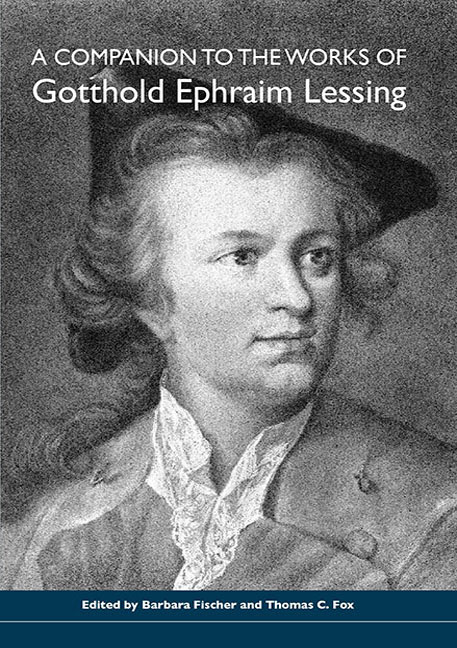Book contents
- Frontmatter
- Contents
- List of Illustrations
- Acknowledgments
- Lessing Editions and Abbreviations
- Selected Works by Lessing
- Introduction
- Lessing's Life, Work, and Times
- Criticism and Aesthetics
- Philosophy and Theology
- Drama and Drama Theory
- Reception
- Contact Organizations
- Works Cited
- Notes on the Contributors
- Index
Introduction
Published online by Cambridge University Press: 28 April 2017
- Frontmatter
- Contents
- List of Illustrations
- Acknowledgments
- Lessing Editions and Abbreviations
- Selected Works by Lessing
- Introduction
- Lessing's Life, Work, and Times
- Criticism and Aesthetics
- Philosophy and Theology
- Drama and Drama Theory
- Reception
- Contact Organizations
- Works Cited
- Notes on the Contributors
- Index
Summary
One of the most independent thinkers in European intellectual history, a combative critic and major playwright, Gotthold Ephraim Lessing (1729–1781) contributed in decisive and lasting fashion to the discussion of philosophy, theology, and literature within the German-speaking countries and beyond. Lessing lived during the period of German Enlightenment, that liminal point between the age of religious authority and the more secular culture of modern times. He supplied new impulses to Christian theology, initiating one of the major theological disputes of the eighteenth century while contributing to debates on religious tolerance and on the emancipation of the German Jews. He published Laokoon (Laocoon, 1766) a trailblazing treatise on aesthetics, a work still influential today, particularly in semiotics and media theory. Long before Germany became a unified nation-state, Lessing supported the first attempt to create a German national theater, one financed by citizens and independent of any court. He wrote with great originality on drama theory, reinterpreting Aristotle for the eighteenth century, reforming German drama and opening it to contemporary social concerns of the rising middle class. As a playwright, Lessing employed a dramatic genre that was new to Germany, and in so doing wrote Miß Sara Sampson (1755), the first successful German “domestic” or “bourgeois” tragedy. He is also the author of one of the finest German comedies, Minna von Barnhelm (1767). In his final dramatic masterpiece, Nathan der Weise (Nathan the Wise, 1779), he writes of Christianity, Judaism, and Islam, of religious intolerance and the clash of civilizations. The centerpiece of that play, the parable of the rings, has entered the world's cultural heritage. Still resonating today, Lessing's dramas are the oldest theater pieces in German that continue to be performed regularly on German-speaking and international stages. Lessing's plays and his drama theory influenced Goethe, Schiller, Hebbel, Hauptmann, Ibsen, Strindberg, Schnitzler, and Brecht, among many others. F. J. Lamport in fact calls Lessing not merely the founder of modern German drama but of modern European drama.
The “first German intellectual in the modern sense of the word,”Lessing authored not only dramatic works, but also poetry, fables, and parables.
- Type
- Chapter
- Information
- A Companion to the Works of Gotthold Ephraim Lessing , pp. 1 - 10Publisher: Boydell & BrewerPrint publication year: 2005

